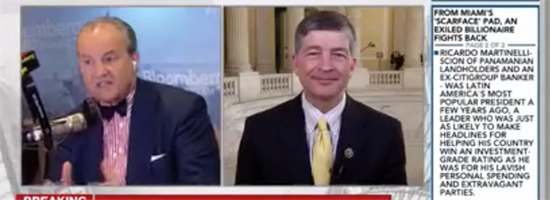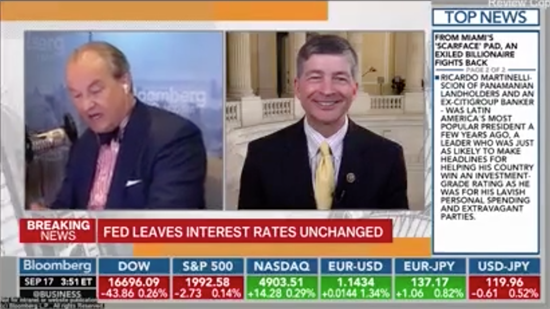Hensarling Reacts to Fed Decision on Interest Rates
Washington,
September 17, 2015
WASHINGTON – Financial Services Committee Chairman Jeb Hensarling (R-TX) reacted to the Federal Reserve’s decision to keep its benchmark interest rates near zero, where they’ve been since December 2008. During an interview on Bloomberg TV, Chairman Hensarling called the artificially low rates “unsustainable” and said legislation passed by the committee is needed to make the Fed more transparent. Excerpts from the interview are below. “Well I think we’d like to see the Fed getting back to more sustainable, organic, market-based interest rates. As we all know, these are unsustainable interest rates and now we’ve probably had the longest tease in Federal Reserve history and so-called ‘forward guidance,’ clearly there’s not much guidance in forward guidance.” “I do not think it’s good for the economy and ultimately the challenges that our economy faces…are mainly fiscal challenges, not monetary. And so they are trying to fill a vacuum that they cannot fill and I think ultimately doing more harm than good.” “Just about every economist I know believes it is unsustainable to create these artificially low interest rates. Clearly it’s not solving the problem or we wouldn’t have the slowest economic recovery in our Republic’s history. So it’s not working and it causes market gyrations because the Fed doesn’t have a predictable methodology that they use that they communicate to the investing public. And that’s one of the reasons that under Bill Huizenga of Michigan, our monetary policy subcommittee chairman, we’re putting forth legislation to require the Fed to let us know -- you create whatever methodology rule or approach you want to do, but you’ve got to tell us what are the variables you’re considering, how you weigh them, what’s going to move those variables and come to the public and communicate to the rest of us. That’s the bare minimum they can do to be transparent, and I think it would lead to less gyrations in our market, not more.” “We’ve had way too much, I think, of a Washington-New York Fed axis and we need to bring in that voice of relationship banking, community banking into the equation. I think that would be important to have at the table. But, at the end of the day, until we do something about the regulatory onslaught, the high tax burden and make America a place where people want to do business again, there’s just so much the Fed can do. My fear is they’re creating asset bubbles through the economy and possibly leading us into the next great financial crisis when they were a contributing factor to the last.” ### |



